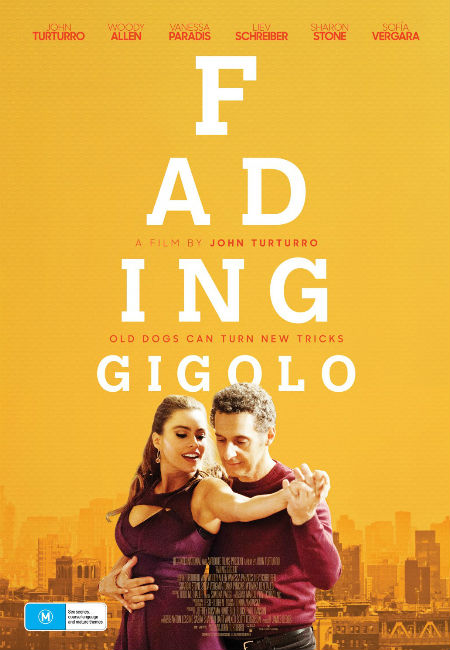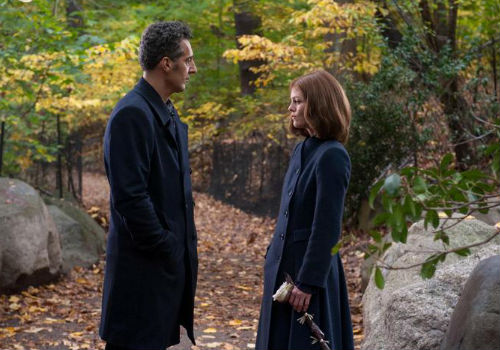
There is always a pleasing sense of nuance and sensitivity in John Turturro’s films, a sense that his characters are not simply there to provide fodder for an exploitative dramatic narrative, that they matter and he cares about them.
Granted every writer harbours understandable feelings of parental concern about the people who populate their stories – Turturro both wrote, directed and stars in Fading Gigolo, which also features an animated top of his game Woody Allen – but you get the sense that the Brooklyn born and based actor is more proprietorial than most.
It’s certainly evident in Fading Gigolo, a movie that balances a slew of implausible premises, all of which could have been played for over the top laughs, melodrama or movie-of-the-week faux-intensity but which are instead treated with rare sensitivity, gentle humour and a laudable appreciation for the emotional frailties of human existence.
Hence, the film’s premise, which pivots on the faintly ludicrous idea of a newly out of business bookstore owner, Murray (Woody Allen) proposing to his long standing friend, under-employed florist Fioravante (John Turturro) that the latter should act as a escort for the former’s dermatologist Dr. Parker (an admirably restrained Sharon Stone) manages to come across instead as quirky and almost entirely reasonable as a means of handling economically-challenging times.

Much of this comes down to Turturro’s ability to invest self-effacing, quietly-spoken Fioravante with a thoughtful gentleness and old-fashioned courtesy that brings a gentlemanly demeanour to his successful encounters with Parker and her best friend Selima (Sofía Vergara), with whom he is supposed to have a threesome.
In fact so successful is he with these lonely, well-heeled career women that business is soon booming and Murray in particular in able to treat his joyfully gregarious partner and mother of four Othella (Tonya Pinkins) to a new couch, which she sweetly treats as worth more than all the gold in the world and a sign that things are on the up and up.
And they are, in ways financial and emotional, both for Murray (who fairly skips through each scene, gleefully throwing out quip-filled dialogue as he goes) Fioravante, who soon finds himself falling for a wholly unusual client, Avigal (Vanessa Paradis), melancholic, strictly-observant widow of a deceased Hasidic rabbi who is finding life emotionally isolating to the point of suffocation.
If he were a less sensitive or insightful writer/director, Turturro could have easily played up this meeting of a black-clad, pious Jewish widow meeting with a slightly ill-at-ease part-time gigolo for cheap laughs of trashy melodrama, but instead it becomes the most affecting, sensitively-handled part of the entire film.
At their first encounter, which is orchestrated by Murray as less about sex than companionship – there is in fact no sexual activity between the two, another well-judged move by the admirable Turturro – Avigal cries as Fioravante massages her, deeply moved by being touched for the first time since her husband’s untimely death.

An unlikely intimate friendship springs up, watched like a hawk from a distance (and then not in one oddly out of place scene) by Avigal’s would-be suitor Dovi (Liev Schreiber), a dedicated member of the Shomrim, volunteers that patrol Jewish neighbourhoods and ensure both security and social piety are upheld, that sees Avigal emerge from her post-grief emotional hibernation a transformed woman.
It is patently obvious that Fioravante and Avigal can never be together, occupying as they do the roles of a far more authentic, grounded and far more grown up version of Romeo and Juliet, yet when events take their expected turn, you still feel deeply for the kind and considered man that brings the Jewish widow a new lease on life.
Their relationship, though doomed in one sense, is the emotional lynchpin of Fading Gigolo,a delightfully charming film that dares to throw all manner of unlikely ideas into the narrative pot and have them largely succeed, thanks to impressive performances, a beautifully written screenplay, and John Turturro’s ability, as always, to invest over the top premises with nuanced, sensitive humanity and the sense that the lives of these people matter, and matter greatly.